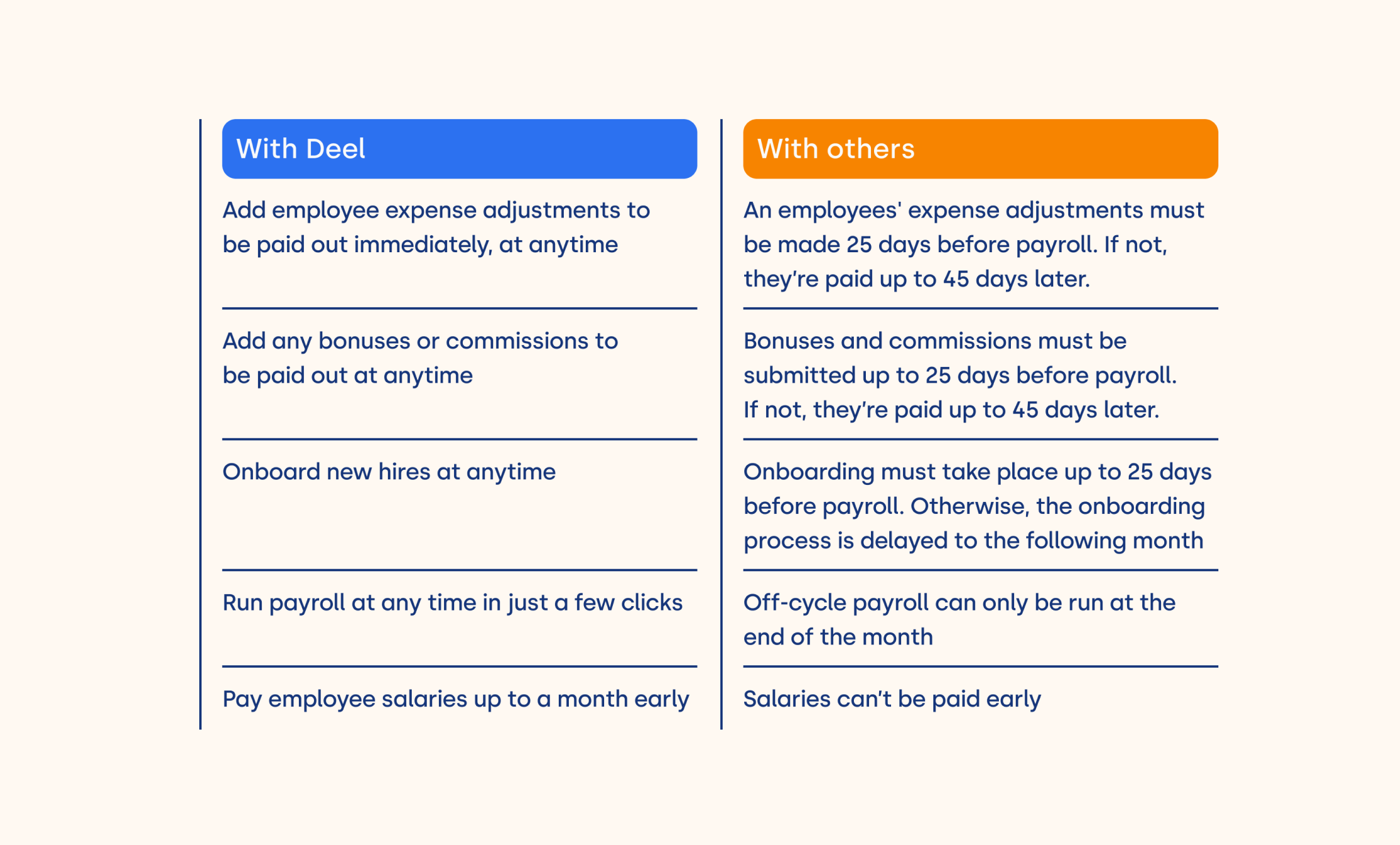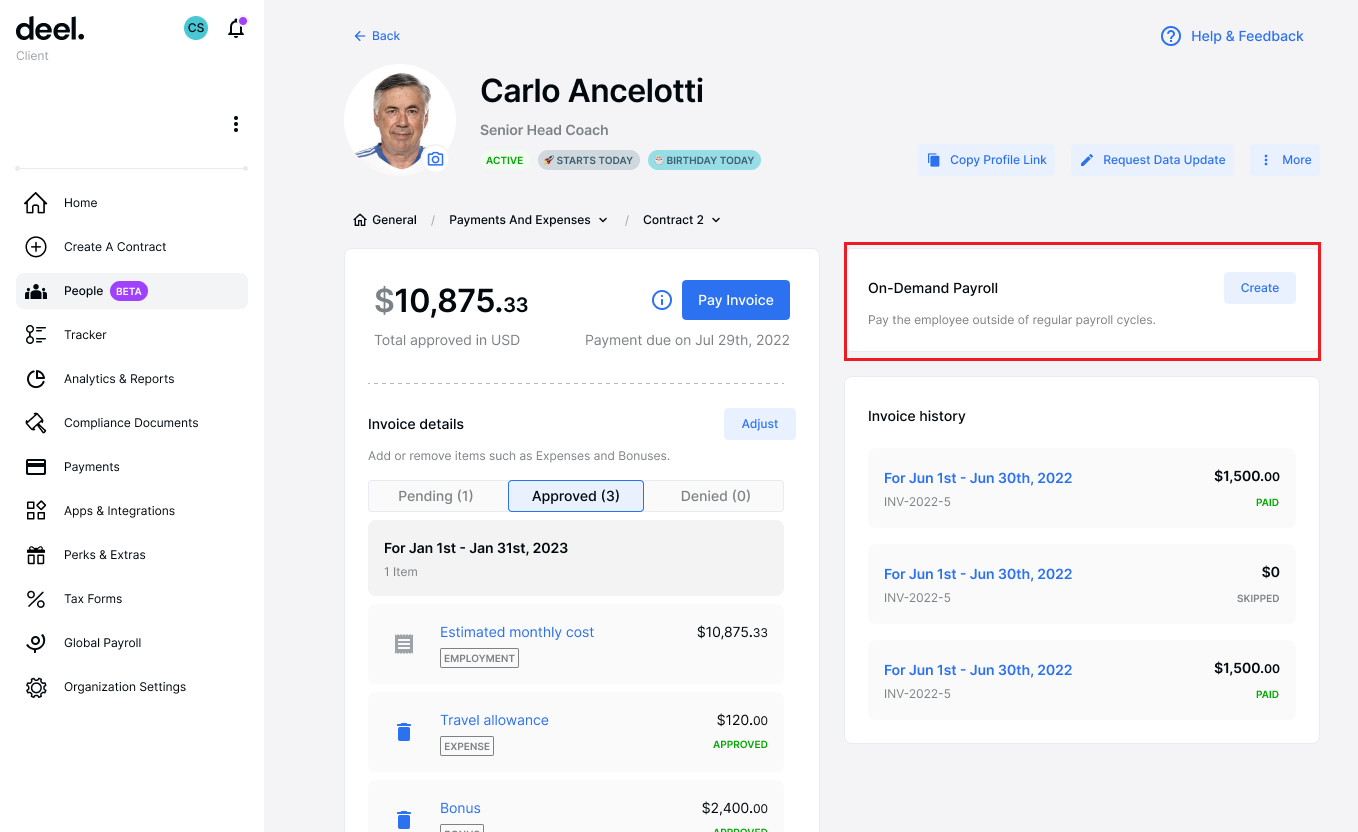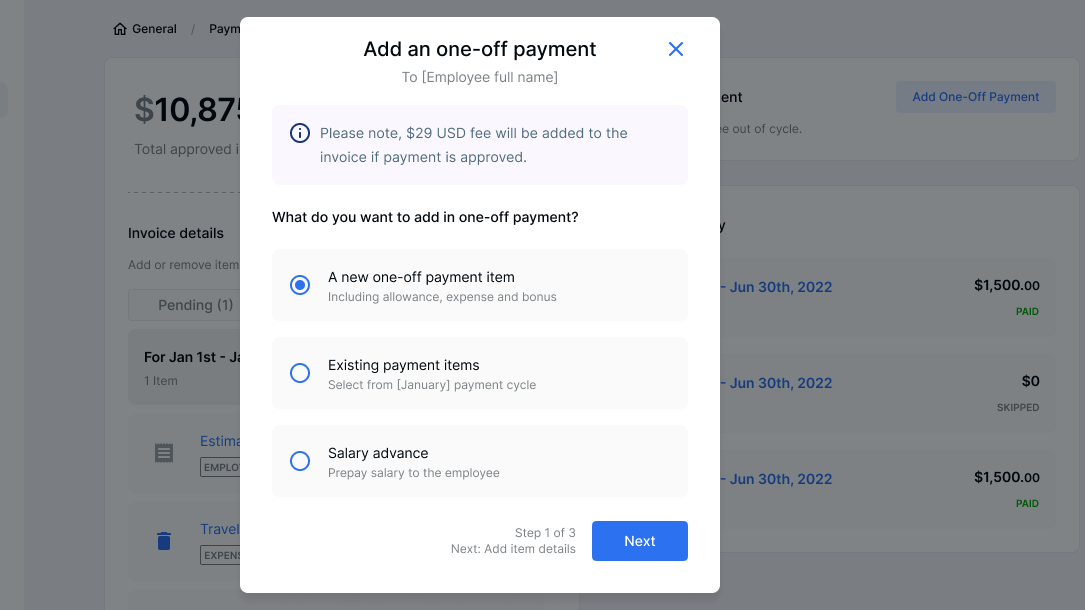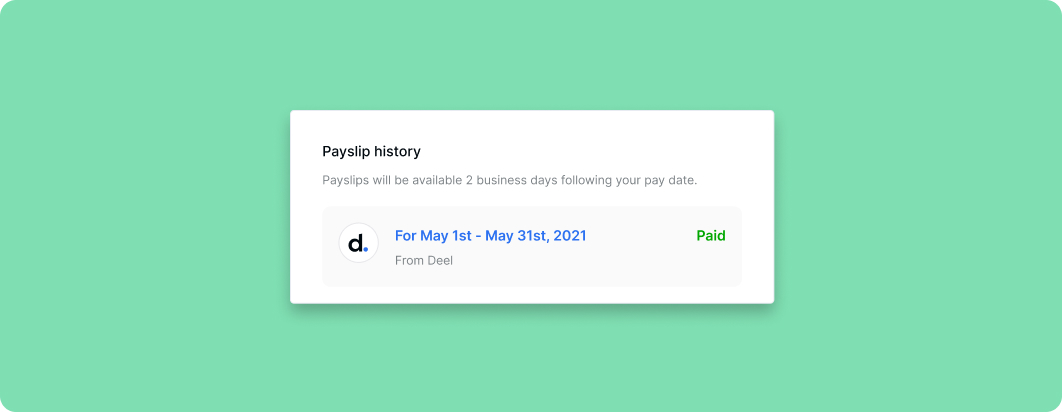
Off-cycle payroll refers to the process of employers issuing paychecks to employees outside of their regular pay cycle.
While regular payroll cycles follow a set schedule for recurring payments, off-cycle payroll is used selectively to ensure prompt and accurate employee compensation during unforeseen events. Off-cycle payroll is also used for unique payment requirements.
For example, correcting errors in regular pay, providing payments in a timely manner to departing employees, compensating for missed pay deadlines, distributing bonuses or incentives, and addressing other exceptional circumstances.
Understanding off-cycle payroll is crucial for both employers and employees as it ensures timely and accurate compensation during unexpected situations. It also maintains employee trust and satisfaction when making payments timeously, enabling businesses to navigate payroll challenges efficiently.
Deel’s On-Demand Payroll enables employers to issue new or existing payment items as well as off-cycle salary advances to employees.
Deel is one of the few global payroll platforms that offer an effortless, self-service way to process off-cycle payments. Since some manual work is required to reconcile taxes and finalize payments for off-cycle payroll, we charge a small flat fee of $29.
See also: Introducing Faster, More Flexible Payroll
Contents
Reasons for off-cycle payroll
There are several instances where off-cycle payroll payments are necessary, both for employee satisfaction and for compliance with labor laws and regulations. If you work with a remote team, it’s essential to consider these requirements for employees in different geographical locations.
Consider the following common reasons for signing an off-cycle check.
- Correcting errors in an employee’s regular paycheck, such as incorrect deductions or miscalculated hours from the timesheet
- Termination or resignation pay which demands immediate attention and off-cycle processing
- Missed payroll deadlines due to unforeseen circumstances
- Bonus or incentive payments that are not part of the regular pay cycle
- Commissions or overtime pay which are not calculated within the regular pay cycle
- Salary adjustments during the pay period due to promotions, role changes, or other reasons
- Correcting tax withholdings
- Emergency payments where employees need to receive wages urgently due to financial hardship
Off-cycle payments offer flexibility and convenience, allowing employers to address the above-mentioned payment needs without delay. With off-cycle payments, employees can receive timely compensation for unique situations outside of regular payroll schedules.
“The thing I love most about Deel is the multiple options to withdraw your funds. It makes it really simple to have your money—providing multiple withdrawal methods including crypto. Also, the withdrawals are seamless, and payments are on time.” — Tifuh Cedric, Turing
Types of off-cycle payments
Off-cycle payments include a range of specialized payroll transactions designed to address unique circumstances and exceptional needs outside the regular pay cycle.
Consider the following types of off-cycle payments.
One-time bonuses
One-time bonuses are given to employees for exceptional performance or contributions beyond their job description. Paying a one-time bonus as an off-cycle payment offers an incentive and motivates employees to put their best foot forward. It also acknowledges their efforts, which enhances employee morale and boosts commitment to the organization.
Severance packages
Severance packages are offered to employees who are terminated or laid off. The immediate need for payment makes severance packages an off-cycle payment and typically includes compensation, benefits, and other incentives such as extended healthcare coverage, which supports employees during the transition period between jobs.
Advance payments
Advance payments are off-cycle payments that provide employees with a portion of their future earnings before the regular payday. These payments are approved in urgent situations, such as unforeseen financial emergencies, where a direct deposit into an employee bank account can be a saving grace.
Reimbursements
Repaying an employee’s out-of-pocket expenses for business activities often constitutes an off-cycle payment. These reimbursements may include travel costs, office supplies, and other work-related expenses. By processing reimbursements outside of regular payroll, you ensure employees are reimbursed for their expenses without delay.
Challenges and considerations
Handling off-cycle payments presents employers with potential challenges and important considerations. It’s important to overcome these challenges as unscheduled payroll transactions require precise execution to ensure compliance, accuracy, and employee satisfaction.
Consider the following common challenges.
Legal compliance
Employers must follow labor laws and regulations that govern payroll processes, such as timely payment of final wages for departing employees, accurate overtime calculations, and ensuring the appropriate withholding rate for tax.
Stay informed about labor laws and regulations in each region where you employ an individual. Create a clear policy that outlines appropriate circumstances for off-cycle payroll and ensure your payroll and human resources team is updated on compliance requirements.
Tax implications
Off-cycle payments may have specific tax implications, so it’s important to accurately calculate and withhold the correct amount of taxes for off-cycle payments. Failure to do so could lead to tax compliance issues.
To prevent tax implications, consult tax experts or your payroll provider to understand the effects of various off-cycle payments. A robust payroll system helps accurately calculate and deduct the appropriate taxes for each off-cycle payment.
Data confidentiality
Sensitive employee information is often involved in off-cycle payments. For example, reasons for termination or bonus allocations. These details must be handled discreetly to protect employee privacy and prevent potential legal or ethical concerns.
Establishing strict protocols for handling sensitive employee data during an off-cycle payroll run is essential to maintain confidentiality. Limit access to information on a need-to-know basis, encrypt electronic data, and provide training to payroll staff on data protection.
“The intangible value is using Deel to handle all the compliance aspects of hiring and operating payroll processes around the world. We can now easily manage payroll because I can see exactly when each payment is made. In addition, I can monitor vital metrics like analytics and tax form compliance.” — Doni Andriansyah, Chief of Finance and Risk Management Officer, Telin
Read more about how Deel helps Telin simplify payroll and compliance.
Payroll accuracy
Off-cycle payments impact payroll and demand precise calculations to avoid errors in compensation. Payroll errors could lead to employee dissatisfaction, potential legal disputes, or financial discrepancies.
Implement a thorough review process for off-cycle payments to verify the accuracy of calculations and employee information. It helps to regularly audit the payroll system to ensure precise and error-free off-cycle payments.
Timely communication
It’s important that employers promptly inform employees about the reason for off-cycle payments, the amount being dispersed, and the payment date. Timely communication promotes transparency and avoids misunderstandings.
Make an effort to maintain open and transparent communication channels with employees and use multiple communication channels, such as emails and in-person meetings, to ensure clear communication.
Impact on employees
Off-cycle payments have a significant impact on employees’ financial situation and overall job satisfaction.
For example, off-cycle payments impact employees in the following ways.
- Financial stability during emergencies or transition periods
- Improved morale and motivation as employees feel recognized and valued for work beyond regular compensation
- Higher job satisfaction as employers are responsive and considerate of the employee’s needs
- Trust and transparency with the proper handling of off-cycle payments
- Better employee engagement and loyalty when off-cycle payments are linked to performance or challenging times, helping boost employee retention
- Attract talent as candidates perceive the company as caring and supportive
- Improved productivity and performance as employees are more confident in their financial situation and experience higher job satisfaction
See also: How On-Demand Pay Unlocks Higher Employee Productivity, Satisfaction, and Retention
“With On-Demand Payroll, our clients gain added flexibility. They can easily accommodate a late hire or pay bonuses for special occasions outside the normal payroll schedule, which leads to higher employee satisfaction and retention.” — Ouail El Gharniti, Director of Product (Global Payroll Vertical), Deel
Best practices for managing off-cycle payroll
The following tips are effective in streamlining your off-cycle payroll processes and overcoming challenges.
- Establish clear policies and procedures that outline specific circumstances for off-cycle payments, ensuring consistency and fairness
- Maintain meticulous records of all off-cycle payments, including reasons, amounts, and dates of reimbursement, to assist with auditing and reporting
- Use technology solutions such as Deel’s advanced payroll software and tools to streamline the process, automate calculations, and reduce the risk of errors
- Communicate with employees openly and transparently about off-cycle payments
- Stay up to date with labor laws and regulations to ensure full compliance with legal requirements, tax implications, and employee entitlements
- Implement data security measures to safeguard sensitive employee data
- Process off-cycle payments promptly, especially in the case of an emergency, to address employee concerns and maintain their trust
- Connect off-cycle payments to measurable performance metrics
- Provide training to payroll staff on handling off-cycle payments accurately
- Regularly review off-cycle payment processes and conduct internal audits to identify areas of improvement
Off-cycle payroll with Deel
At Deel, we offer a robust payroll software solution to streamline payroll processing while ensuring compliance. With our On-Demand Payroll feature, EOR clients can pay employees off-cycle directly in the Deel platform. Here’s how:
-
On the Deel platform, go to the employee’s profile page and select the On-Demand Payroll button.
-
Choose the type of one-off payment you want to process, add your request details, and submit your request.
-
The EOR team will review the off-cycle payment. Once approved, they will issue an off-cycle invoice to the client, which they can access by selecting the ‘Payments’ tab on the Deel home page.
-
Deel will issue an off-cycle payslip for the employee. The payslip will be provided instantly or delivered on the next payday cycle, depending on the employee’s local requirements.
See also: About Off-Cycle Payments And On-Demand Payroll For EOR Employees
At Deel, we take pride in enabling 15,000 international clients to run payroll globally without any restrictions or delays, whenever they require it.
Book a 30-minute demo to learn more about issuing off-cycle payments on Deel.





















